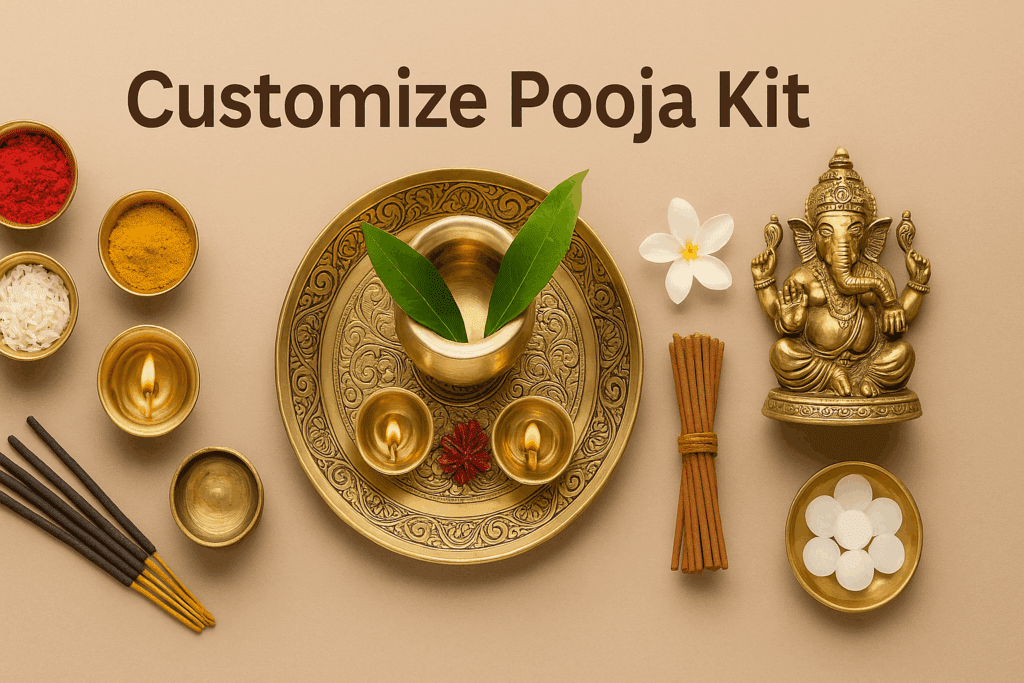1. What types of pooja items are available on Mandirmart?
We offer a wide range of pooja essentials including idols, incense sticks, diyas, camphor, kalash, kumkum, ghee, and more.
2. Are all pooja items sourced from authentic and traditional vendors?
Yes, all our products are sourced directly from reputed temple towns and artisans to ensure authenticity and ritual purity.
3. Do you offer eco-friendly or biodegradable pooja products?
Absolutely! We have a special section for eco-friendly items like clay diyas, organic incense, and biodegradable Ganesha idols.
4. Can I order pooja kits for specific festivals or rituals?
Yes, we offer curated pooja kits for festivals like Diwali, Navratri, Ganesh Chaturthi, and specific rituals like Satyanarayan Katha.
5. Is international shipping available for pooja items?
Yes, we ship selected pooja items globally so devotees abroad can stay connected to their traditions.
6. Are the brass idols and lamps safe for daily pooja use?
Yes, all our brass items are made from high-quality, temple-grade materials and are safe for daily spiritual use.
7. Can I customize a pooja kit according to my requirements?

Yes, we offer custom pooja kits. You can contact our support team to create a kit that suits your spiritual needs.
8. Do you provide temple prasad or offerings through Mandirmart?
Yes, you can book temple offerings, get prasadam delivered, and even request special poojas at select temples via our platform.
9. What payment methods do you accept?
We accept all major debit/credit cards, UPI, net banking, and international payment options for global customers.
10. How long does delivery take for pooja items?
Delivery usually takes 3–7 business days in India. International shipping timelines may vary based on location and customs.
11. Does brass turn green or rust?
Brass does not rust since it lacks iron, but it can turn green over time. This green layer, called patina, forms due to oxidation and exposure to moisture or air.
12. Is brass good for heat?
FAQ:
Yes, brass is good for heat conduction. It has excellent thermal conductivity, making it suitable for applications like heat exchangers, radiators, and fittings in plumbing and heating systems.
13. Are brass idols good for pooja?
Yes, brass idols are considered auspicious and durable for pooja. They retain spiritual energy and are commonly used in temples and homes.
14. How do I clean brass idols at home?
Clean brass idols using a mix of lemon juice and salt or vinegar and baking soda. Rinse well and dry with a soft cloth to avoid tarnish.
15. Do copper items require special care?
Yes, copper oxidizes over time. Regular cleaning with lemon and salt helps maintain shine. Avoid storing acidic substances in copper vessels.
16. Is it safe to drink water stored in copper vessels?
Yes, storing water in copper vessels for 6–8 hours can offer health benefits. However, overuse or long-term storage can cause copper toxicity.
17. Can I keep brass idols in the bedroom?
It’s generally recommended to place brass idols in the pooja room or clean areas. Avoid keeping them in bedrooms or bathrooms for spiritual reasons.
18. What is the benefit of using brass and copper in pooja items?
Brass and copper are believed to purify surroundings and enhance positive energy, making them ideal for spiritual rituals and offerings.
19. How often should I polish pooja items?
Polish pooja items once a month or as needed, especially before festivals. This keeps them clean and maintains their spiritual and aesthetic appeal.
20. Are antique-looking brass idols better than polished ones?
Both are good; antique-finish idols offer a traditional look, while polished ones are brighter. Choose based on your decor and spiritual preferences.
